- Home
- Emile Gaboriau
Baron Trigault's Vengeance Page 5
Baron Trigault's Vengeance Read online
Page 5
V.
How was it that a clever man like M. Fortunat made such a blunder asto choose a Sunday, and a racing Sunday too, to call on M. Wilkie. Hisanxiety might explain the mistake, but it did not justify it. He feltcertain, that under any other circumstances he would not have beendismissed so cavalierly. He would at least have been allowed to develophis proposals, and then who knows what might have happened?
But the races had interfered with his plans. M. Wilkie had beencompelled to attend to Pompier de Nanterre, that famous steeplechaser,of which he owned one-third part, and he had, moreover, to give ordersto the jockey, whose lord and master he was to an equal extent. Thesewere sacred duties, since Wilkie's share in a race-horse constitutedhis only claim to a footing in fashionable society. But it was a strongclaim--a claim that justified the display of whips and spurs thatdecorated his apartments in the Rue du Helder, and allowed him to aspireto the character of a sporting man. Wilkie really imagined that folkswere waiting for him at Vincennes; and that the fete would not becomplete without his presence.
Still, when he presented himself inside the enclosure, a cigar in hismouth, and his racing card dangling from his button-hole, he was obligedto confess that his entrance did not create much of a sensation. Anastonishing bit of news had imparted unusual excitement to the ring.People were eagerly discussing the Marquis de Valorsay's suddendetermination to pay forfeit and withdraw his horses from the contest;and the best informed declared that in the betting-rooms the eveningbefore he had openly announced his intention of selling his racingstable. If the marquis had hoped that by adopting this course he wouldsilence the suspicions which had been aroused, he was doomed to grievousdisappointment. The rumor that he had secretly bet against his ownhorse, Domingo, on the previous Sunday, and that he had given orders notto let the animal win the race, was steadily gaining credence.
Large sums had been staked on Domingo's success. He had been thefavorite in the betting ring and the losers were by no means pleased.Some declared that they had seen the jockey hold Domingo back; and theyinsisted that it was necessary to make an example, and disqualify boththe marquis and his jockey. Still one weighty circumstance pleaded inM. de Valorsay's favor--his fortune, or, at least, the fortune he wassupposed to possess. "Why should such a rich man stoop to cheat?" askedhis defenders. "To put money into one's pocket in this way is even worsethan to cheat at cards! Besides, it's impossible! Valorsay is above suchcontemptible charges. He is a perfect gentleman."
"Perhaps so," replied the skeptical bystanders. "But people said exactlythe same of Croisenois, of the Duc de H., and Baron P., who were finallyconvicted of the same rascality that Valorsay is accused of."
"It's an infamous slander! If he had been inclined to cheat, he couldhave easily diverted suspicion. He would have let Domingo come insecond, not third!"
"If he were not guilty, and afraid of detection, he wouldn't pay forfeitto-day nor sell his horses."
"He only retires from the turf because he's going to marry----"
"Nonsense! That's no reason whatever."
Like all gamblers, the frequenters of the turf are distrustful andinclined to be quarrelsome. No one is above their suspicions when theylose nor above their wrath when they are duped. And this Domingo affairunited all the losers against Valorsay; they formed a little battalionof enemies who were no doubt powerless for the time being, but who wereready to take a startling revenge whenever a good opportunity presenteditself. Naturally enough, M. Wilkie sided with the marquis, whom he hadheard his friend, M. de Coralth, speak of on several occasions. "Accusethe dear marquis!" he exclaimed. "It's contemptible, outrageous. Why,only last evening he said to me, 'My good friend, Domingo's defeat costme two thousand louis!'" M. de Valorsay had said nothing of the kind,for the very good reason that he did not even know Wilkie by sight;still, no one paid much heed to the assertion, whereat Wilkie feltvexed, and resolved to turn his attention to his jockey.
The latter was a lazy, worthless fellow, who had been dismissed fromevery stable he had previously served in, and who swindled and robbedthe young gentlemen who employed him without either limit or shame.Although he made them pay him a very high salary--something like eightthousand francs a year--on the plea that it was most repugnant to hisfeelings to act as a groom, trainer, and jockey at the same time, heregularly every month presented them with fabulous bills from the grainmerchant, the veterinary surgeon, and the harness-maker. In addition, heregularly sold Pompier's oats in order to obtain liquor, and in fact thepoor animal was so nearly starved that he could scarcely stand on hislegs. The jockey ascribed the horse's extreme thinness to a system ofrigorous training; and the owners did not question the statement in theleast. He had made them believe, and they in turn had made many othersbelieve, that Pompier de Nanterre would certainly win such and such arace; and, trusting in this fallacious promise, they risked their moneyon the poor animal--and lost it.
In point of fact, this jockey would have been the happiest mortal in theworld if such things as steeple-chases had never existed. In the firstplace, he judged, with no little reason, that it was dangerous to leaphurdles on such an animal as Pompier; and, secondly, nothing irritatedhim so much as to be obliged to promenade with his three employers inturn. But how could he refuse, since he knew that if these young menhired him, it was chiefly, or only in view of, displaying themselvesin his company. It afforded them untold satisfaction to walk to and froalong the course in front of the grand stand, with their jockey in hisorange jacket with green sleeves. They were firmly convinced that hereflected enormous credit upon them, and their hearts swelled with joyat the thought of the envy they no doubt inspired. This conviction gaverise indeed to terrible quarrels, in which each of the three owners waswont to accuse the others of monopolizing the jockey.
On this occasion, M. Wilkie--being fortunate enough to arrive thefirst--immediately repaired to Pompier de Nanterre's stall. Never hadcircumstances been more favorable for a display of the animal's speed.The day was magnificent; the stands were crowded, and thousands of eagerspectators were pushing and jostling one another beyond the ropes whichlimited the course. M. Wilkie seemed to be everywhere; he showed himselfin a dozen different places at once, always followed by his jockey, whomhe ordered about in a loud voice, with many excited gesticulations. Andhow great his delight was when, as he passed through the crowd, he heardpeople exclaim: "That gentleman has a racing stable. His horses aregoing to compete!" What bliss thrilled his heart when he overheard theadmiring exclamation of some worthy shopkeeper who was greatly impressedby the gay silk jacket and the top-boots!
But, unfortunately, this happiness could not last forever. His partnersarrived, and claimed the jockey in their turn. So M. Wilkie left thecourse and strolled about among the carriages, until at last he foundan equipage which was occupied by the young ladies who had acceptedhis invitation to supper the evening before, and who were now making aprofuse display of the very yellowest hair they possessed. This affordedhim another opportunity of attracting public attention, and to givingproofs of his "form," for he had not filled the box of his carriage withchampagne for nothing. At last the decisive moment came, and he madehimself conspicuous by shouting. "Now! Now! Here he is! Look! Bravo,Pompier! One hundred on Pompier!"
But, alas! poor Pompier de Nanterre fell exhausted before half thedistance was accomplished; and that evening Wilkie described his defeat,with a profusion of technical terms that inspired the uninitiated withthe deepest awe. "What a disaster, my friends," he exclaimed. "Pompierde Nanterre, an incomparable steeplechaser, to break down in such afashion! And beaten by whom? My Mustapha, an outsider, without anyrecord whatever! The ring was intensely excited--and I was simplycrazed."
However, his defeat did not affect him very deeply. It was forgotten atthought of the inheritance which his friend Coralth had spoken to himabout. And to-morrow M. de Coralth would tell him the secret. He hadonly twenty hours longer to wait! "To-morrow! to-morrow!" he said tohimself again and again, with a thrill of mingled joy a
nd impatience.And what bright visions of future glory haunted him! He saw himself thepossessor of a magnificent stud, of sufficient wealth to gratify everyfancy; he would splash mud upon all the passers-by, and especially uponhis former acquaintances, as he dashed past them in his superb equipage;the best tailor should invent astonishing garments for him; he wouldmake himself conspicuous at all the first performances in a stage-box,with the most notorious women in Paris; his fetes would be described inthe papers; he would be the continual subject of comment; he would becredited with splendid, perfect "form."
It is true that M. de Coralth had promised him all this, without a wordof explanation; but what did that matter? Should he doubt his friend'sword? Never! The viscount was not merely his model, but his oracle aswell. By the way in which he spoke of him, it might have been supposedthat they had been friends from their childhood, or, at least, that theyhad known each other for years. Such was not the case, however. Theiracquaintance dated only seven or eight months back, and their firstmeeting had apparently been the result of chance; though it is needlessto say, perhaps, that this chance had been carefully prepared by M. deCoralth. Having discovered Madame Lia d'Argeles's secret, the viscountwatched Wilkie, ascertained where he spent his evenings, contrived a wayof introducing himself into his society, and on their third meeting wasskilful enough to render him a service--in other words, to lend himsome money. From that moment the conquest was assured; for M. de Coralthpossessed in an eminent degree all the attributes that were likely todazzle and charm the gifted owner of Pompier de Nanterre. First ofall, there was his title, then his impudent assurance and his apparentwealth, and last, but by no means least, his numerous and fashionableacquaintances. He was not long in discovering his advantage, and inprofiting by it. And without giving M. Wilkie an inkling of the truth,he succeeded in obtaining from him as accurate a knowledge of his pastcareer as the young fellow himself possessed.
M. Wilkie did not know much concerning his origin or his early life; andhis history, so far as he was acquainted with it, could be told in afew words. His earliest recollection was of the ocean. He was sure,perfectly sure, that he had made a very long sea voyage when only alittle child, and he looked upon America as his birthplace. The Frenchlanguage was certainly not the first he had learned, for he stillremembered a limited number of English phrases. The English word"father" was among those that lingered in his memory; and now, aftera lapse of twenty years, he pronounced it without the least foreignaccent. But while he remembered the word perfectly well, no recollectionremained to him of the person he had called by that name. His firstsensations were those of hunger, weariness, and cold. He recollected,and very distinctly too, how on one long winter night, a woman haddragged him after her through the streets of Paris, in an icy rain. Hecould still see himself as he wandered on, crying with weariness, andbegging for something to eat. And then the poor woman who held him bythe hand lifted him in her arms and carried him on--on, until her ownstrength failed, and she was obliged to set him on the ground again. Avague portrait of this woman, who was most probably his mother, stilllingered in his memory. According to his description, she was extremelyhandsome, tall, and very fair. He had been particularly impressed withthe pale tint and profusion of her beautiful hair.
Their poverty had not lasted long. He remembered being installed withhis mother in a very handsome suite of rooms. A man, who was stillyoung, and whom he called "Monsieur Jacques," came every day, andbrought him sweetmeats and playthings. He thought he must have beenabout four years old at that time. However, he had enjoyed thiscomfortable state of things scarcely a month, when one morning astranger presented himself. The visitor held a long conference with hismother, or, at least, with the person whom he called by that name. Hedid not understand what they were talking about, but he was none theless very uneasy. The result of the interview must have justified hisinstinctive fear, for his mother took him on her lap, and embraced himwith convulsive tenderness. She sobbed violently, and repeated againand again in a faltering voice: "Poor child! my beloved Wilkie! Ishall never kiss you again--never, never! 'Alas! It must be so! Give mecourage, my God!"
Those were the exact words; Wilkie was sure on that point. It seemed tohim he could still hear that despairing farewell. For it was indeed afarewell. The stranger took him in his arms and carried him away, inspite of his cries and struggles to escape. This person to whose care hewas confined was the master of a small boarding-school, and his wifewas the kindest and most patient of women. However, this did not preventWilkie from crying and begging for his mother at first; but gradually heforgot her. He was not unhappy, for he was petted and indulged more thanany of the other pupils, and he spent most of his time playing on theterrace or wandering about the garden. But this charming life could notlast for ever. According to his calculation, he was just ten yearsold when, one Sunday, toward the end of October, a grave-looking,red-whiskered gentleman, clad in solemn black with a white necktie,presented himself at the school, and declared that he had beeninstructed by Wilkie's relatives to place him in a college to continuehis education.
Young Wilkie's lamentations were long and loud; but they did not preventM. Patterson--for that was the gentleman's name--from taking him to thecollege of Louis-the-Great, where he was entered as a boarder. As hedid not study, and as he was only endowed with a small amount ofintelligence, he learned scarcely anything during the years he remainedthere. Every Sunday and every fete day, M. Patterson made his appearanceat ten o'clock precisely, took Wilkie for a walk in Paris or theenvirons, gave him his breakfast and dinner at some of the bestrestaurants, bought everything he expressed a desire to have, and atnine o'clock precisely took him back to the college again. During theholidays M. Patterson kept the boy with him, refusing him nothing in theway of pleasure, granting all his wishes, but never losing sight of himfor a moment. And if Wilkie complained of this constant watchfulness,M. Patterson always replied, "I must obey orders;" and this answerinvariably put an end to the discussion.
So things went on until it became time for Wilkie to take his degree.He presented himself for examination; and, of course, he failed.Fortunately, however, M. Patterson was not at a loss for an expedient.He placed his charge in a private school; and the following year, at acost of five thousand francs, he beguiled a poor devil into running therisk of three years' imprisonment, by assuming M. Wilkie's name, andpassing the examination in his place. In possession of the preciousdiploma which opens the door of every career, M. Wilkie now hoped thathis pockets would be filled, and that he would then be set at liberty.But the hope was vain! M. Patterson placed him in the hands of an oldtutor who had been engaged to travel with him through Europe; and asthis tutor held the purse-strings, Wilkie was obliged to follow himthrough Germany, England, and Italy.
When he returned to Paris he was just twenty years old, and the verynext day M. Patterson conducted him to the suite of rooms which hestill occupied in the Rue du Helder. "You are now in your own home, M.Wilkie," said M. Patterson in his most impressive manner. "You are nowold enough to be responsible for your own actions, and I hope you willconduct yourself like an honest man. From this moment you are your ownmaster. Those who gave you your education desire you to study law. If Iwere in your place, I should obey them. If you wish to be somebody, andto acquire a fortune, work, for you have no property, nor anythingto expect from any one. The allowance which is granted you, a far tooliberal one in my opinion, may be cut off at any moment. I don't thinkit right to conceal this fact from you. But at all events until then.I am instructed to pay you five thousand francs quarterly. Here is theamount for the first quarter, and in three months' time I shall send youa similar amount. I say 'shall SEND,' because my business compels meto return to England, and take up my abode there. Here is my Londonaddress; and if any serious trouble befalls you, write to me. Now, myduty being fulfilled, farewell."
"Go to the devil, you old preacher!" growled Wilkie, as he saw the doorclose on the retreating figure of M. Patterson, who had acted as hisguardian for
ten years. None of M. Patterson's wise advice lingeredin the young fellow's mind. To use a familiar expression, "It went inthrough one ear and came out through the other." Only two facts had madean impression upon him: that he was to be his own master henceforth, andthat he had a fortune at his command. There it lay upon the table, fivethousand francs in glittering gold.
If M. Wilkie had taken the trouble to attentively examine the roomswhich had suddenly become his own, he would perhaps have recognized thefact that a loving hand had prepared them for his reception. Countlessdetails revealed the delicate taste of a woman, and the thoughtfultenderness of a mother. None of those little superfluities which delighta young man had been forgotten. There was a box of choice cigars uponthe table, and a jar of tobacco on the mantel-shelf. But Wilkie did nottake time to discover this. He hastily slipped five hundred francs intohis pocket, locked the rest of his money in a drawer, and went out withas lofty an air as if all Paris belonged to him, or as if he had enoughmoney to purchase it.
He had resolved to give a fete in honor of his deliverance, and so hehurried off in search of some of his old college chums. He found two ofthem; and, although it was very wounding to his self-love, M. Wilkie wasobliged to confess to them that this was his first taste of liberty,and that he scarcely knew what to do with himself. Of course his friendsassured him that they could quickly make him acquainted with the onlylife that it was worth while living; and, to prove it, they acceptedthe invitation to dinner which he immediately offered them. It was aremarkable repast. Other acquaintances dropped in, the wine flowed inrivers; and after dinner they danced. And at day-break, having servedhis apprenticeship at baccarat, M. Wilkie found himself without a pennyin his pocket, and face to face with a bill of four hundred francs, forwhich amount he was obliged to go to his rooms, under the escort of oneof the waiters. This first experiment ought to have disgusted him, or atleast have made him reflect. But no. He felt quite in his element in thesociety of dissipated young men and enamelled women. He swore that hewould win a place in their midst, and an influential place too. Butit was easier to form this plan than to carry it into execution, as hediscovered when, at the end of the month, he counted his money to seewhat remained of the five thousand francs that had been given him forhis quarterly allowance. He had just three hundred francs left.
Twenty thousand francs a year is what one chooses to make it--wealth orpoverty. Twenty thousand francs a year represents about sixty francs aday; but what are sixty francs to a high liver, who breakfasts and dinesat the best restaurants, whose clothes are designed by an illustrioustailor, who declines to make a pair of trousers for less than a hundredfrancs? What are three louis a day to a man who hires a box for firstperformances at the opera, to a man who gambles and gives expensivesuppers, to a man who drives out with yellow-haired demoiselles, andwho owns a race-horse? Measuring his purse and his ambition, M. Wilkiediscovered that he should never succeed in making both ends meet. "Howdo other people manage?" he wondered. A puzzling question! Every eveninga thousand gorgeously apparelled gentlemen, with a cigar in their mouthand a flower in their button-hole, may be seen promenading between theChaussee d'Antin and the Faubourg Montmartre. Everybody knows them,and they know everybody, but how they exist is a problem which itis impossible to solve. How do they live, and what do they live on?Everybody knows that they have no property; they do nothing, and yetthey are reckless in their expenditures, and rail at work and jeer ateconomy. What source do they derive their money from? What vile businessare they engaged in?
However, M. Wilkie did not devote much time to solving this question."My relatives must wish me to starve," he said to himself. "Not I--I'mnot that sort of a person, as I'll soon let them know." And thereuponhe wrote to M. Patterson. By return of post that gentleman sent him acheque for one thousand francs--a mere drop in the bucket. M. Wilkiefelt indignant and so he wrote again. This time he was obliged to waitfor a reply. Still at last it came. M. Patterson sent him two thousandfrancs, and an interminable epistle full of reproaches. The interestingyoung man threw the letter into the fire, and went out to hire acarriage by the month and a servant.
From that day forward, his life was spent in demanding money and waitingfor it. He employed in quick succession every pretext that could softenthe hearts of obdurate relatives, or find the way to the most closelyguarded cash-box. He was ill--he had contracted a debt of honor--he hadimprudently lent money to an unscrupulous friend--he was about to bearrested for debt. And in accordance with the favorable or unfavorablecharacter of the replies his manner became humble or impertinent, sothat his friends soon learned to judge very accurately of the conditionof his purse by the way he wore his mustaches. He became wise withexperience, however; and on adding all the sums he had receivedtogether, he decided that his family must be very rich to allow him somuch money. And this thought made him anxious to fathom the mystery ofhis birth and his infancy. He finally persuaded himself that he was theson of a great English nobleman--a member of the House of Lords, who wastwenty times a millionaire. And he more than half believed it when hetold his creditors that his lordship, his father, would some day orother come to Paris and pay all his debts. Unfortunately it was notM. Wilkie's noble father that arrived, but a letter from M. Patterson,which was couched as follows:
"MY DEAR SIR, a considerable sum was placed in my hands to meet yourunexpected requirements; and in compliance with your repeated appeals,I have remitted the entire amount to you. Not a penny remains in mypossession--so that my instructions have been fulfilled. Spare yourselfthe trouble of making any fresh demands; they will meet with no reply.In future you will not receive a penny above your allowance, which in myopinion is already too large a one for a young man of your age."
This letter proved a terrible blow to Wilkie. What should he do? He feltthat M. Patterson would not revoke his decision; and indeed he wrote himseveral imploring letters, in vain. Yet never had his need of money beenso urgent. His creditors were becoming uneasy; bills actually rained inupon his concierge; his next quarterly allowance was not due for sometime to come, and it was only through the pawnbroker that he couldobtain money for his more pressing requirements. He had begun toconsider himself ruined. He saw himself reduced to dismissing hiscarriage, to selling his third share of Pompier de Nanterre and losingthe esteem of all his witty friends.
He was in the depths of despair, when one morning his servant wokehim up with the announcement that the Viscount de Coralth was in thesitting-room and wished to speak with him on very important business. Itwas not usually an easy task to entice M. Wilkie from his bed, but thename his servant mentioned seemed to have a prodigious effect uponhim. He bounded on to the floor, and as he hastily dressed himself, hemuttered: "The viscount here, at this hour! It's astonishing! What ifhe's going to fight a duel and wishes me to be his second? That would bea piece of grand good luck and no mistake. It would assure my positionat once. Certainly something must have happened!"
This last remark was by no means a proof of any remarkable perspicuityon M. Wilkie's part. As M. de Coralth never went to bed until two orthree o'clock in the morning, he was by no means an early riser,and only some very powerful reason could explain the presence of hisblue-lined brougham in the street before nine o'clock A.M. And theinfluence that had made him rise betimes in the present case had indeedbeen extremely powerful. Although the brilliant viscount had discoveredMadame d'Argeles's secret, several months previously, he had so fardisclosed it to no one. It was certainly not from any delicacy offeeling that he had held his peace; but only because it had not been forhis interest to speak. Now, however, the sudden death of the Count deChalusse changed the situation. He heard of the catastrophe at his clubon the evening after the count's death, and his emotion was so greatthat he actually declined to take part in a game of baccarat that wasjust beginning. "The devil!" he exclaimed. "Let me think a moment.Madame d'Argeles is the heiress of all these millions--will she comeforward and claim them? From what I know of her, I am inclined to thinkthat she won't. Will she
ever go to Wilkie and confess that she, Liad'Argeles, is a Chalusse, and that he is her illegitimate son? Never!She would rather relinquish her millions, both for herself and forhim, than take such a step. She is so ridiculously antiquated in hernotions." And then he began to study what advantages he might derivefrom his knowledge of the situation.
M. de Coralth, like all persons whose present is more or less uncertain,had great misgivings concerning his future. Just now he was cunningenough to find a means of procuring the thirty or forty thousand francsa year that were indispensable to his comfort; but he had not a farthinglaid by, and the vein of silver he was now working might fail him at anymoment. The slightest indiscretion, the least blunder, might hurl himfrom his splendor into the mire. The perspiration started out on hisforehead when he thought of his peril. He passionately longed for a moreassured position--for a little capital that would insure him his breaduntil the end of his days, and rid him of the grim phantom of povertyforever. And it was this desire which inspired him with the same planthat M. Fortunat had formed. "Why shouldn't I inform Wilkie?" he said tohimself. "If I present him with a fortune, the simpleton ought certainlyto give me some reward." But to carry this plan into execution it wouldbe necessary to brave Madame d'Argeles's anger; and that was attended byno little danger. If he knew something about her, she on her side kneweverything connected with his past life. She had only to speak toruin him forever. Still, after weighing all the advantages and all thedangers, he decided to act, convinced that Madame d'Argeles mightbe kept ignorant of his treason, providing he only played his cardsskilfully. And his matutinal visit to M. Wilkie was caused by a fearthat he might not be the only person knowing the truth, and that someone else might forestall him.
"You here, at sunrise, my friend!" exclaimed Wilkie, as he entered theroom where the viscount was seated. "What has happened?"
"To me?--nothing," replied the viscount. "It was solely on your accountthat I deviated from my usual habits."
"What is it? You frighten me."
"Oh! don't be alarmed. I have only some good news to communicate," andin a careless tone which cleverly concealed his anxiety, the viscountadded: "I have come, my dear Wilkie, to ask you what you would bewilling to give the man who put you in possession of a fortune ofseveral millions?"
M. Wilkie's face turned from white to purple at least three times in tenseconds; and it was in a strangely altered voice that he replied: "Ah!that's good--very good--excellent!" He tried his best to laugh, buthe was completely overcome; and, in fact, he had cherished so manyextravagant hopes that nothing seemed impossible to him.
"Never in all my life have I spoken more seriously," insisted theviscount.
His companion at first made no reply. It was easy to divine the conflictthat was raging in his mind, between the hope that the news was trueand the fear of being made the victim of a practical joke. "Come, myfriend," he said at last, "do you want to poke fun at me? That wouldn'tbe polite. A debtor is always sacred, and I owe you twenty-five louis.This is scarcely the time to talk of millions. My relatives have cut offmy supplies; and my creditors are overwhelming me with their bills----"
But M. de Coralth checked him, saying gravely: "Upon my honor, I am notjesting. What would you give a man who--"
"I would give him half of the fortune he gave me."
"That's too much!"
"No, no!"
He was in earnest, certainly. What wouldn't a man promise in allsincerity of soul to a fellow mortal who gave him money when he hadnone--when he needed it urgently and must have it to save himself fromruin?
At such a moment no commission, however large, seems exorbitant. It isafterward, when the day of settlement comes, that people begin to findfault with the rate of interest.
"If I tell you that one-half is too much, it is because such is reallythe case. And I am the best judge of the matter, since I am the man whocan put you in possession of this enormous fortune."
M. Wilkie started back in speechless amazement.
"This astonishes you!" said the viscount; "and why, pray? Is it becauseI ask for a commission?"
"Oh! not at all!"
"It is not perhaps a very gentlemanly proceeding, but it is a sensibleone. Business is business. In the afternoon, when I am in a restaurant,at the club, or in a lady's boudoir, I am merely the viscount and thegrand seigneur. All money questions sicken me. I am careless, liberal,and obliging to a fault. But in the morning I am simply Coralth, a manof the middle classes who doesn't pay his bills without examining them,and who watches his money, because he doesn't wish to be ruined and endhis brilliant career as a common soldier in some foreign legion."
M. Wilkie did not allow him to continue. He believed, and his joy waswild--delirious. "Enough, enough!" he interrupted. "A difficulty betweenus! Never! I am yours without reserve! Do you understand me? How muchmust you have? Do you wish for it all?"
But the viscount was unmoved. "It is not fitting that I should fix uponthe indemnity which is due to me. I will consult a man of business; andI will decide upon this point on the day after to-morrow, when I shallexplain everything to you."
"On the day after to-morrow! You won't leave me in suspense forforty-eight hours?"
"It is unavoidable. I have still some important information to procure.I lost no time in coming to you, so that I might put you on your guard.If any scoundrel comes to you with proposals, be extremely careful.Some agents, when they obtain a hold on an estate, leave nothing for therightful owner. So don't treat with any one."
"Oh, no! You may rest assured I won't."
"I should be quieter in mind if I had your promise in writing."
Without a word, Wilkie darted to a table, and wrote a short contract bywhich he bound himself to give M. Ferdinand de Coralth one-half of theinheritance which the aforesaid Coralth might prove him to be entitledto. The viscount read the document, placed it in his pocket, and thensaid, as he took up his hat:
"Very well. I will see you again on Monday."
But M. Wilkie's doubts were beginning to return. "Monday, so be it!"said he; "but swear that you are not deceiving me."
"What, do you still doubt me?"
M. Wilkie reflected for a moment; and suddenly a brilliant inspirationdarted through his brain. "If you are speaking the truth, I shall soonbe rich," said he. "But, in the meantime, life is hard. I haven't apenny, and it isn't a pleasant situation. I have a horse entered for therace to-morrow, Pompier de Nanterre. You know the animal very well. Thechances are enormously in his favor. So, if it wouldn't inconvenienceyou to lend me fifty louis."
"Certainly," interrupted the viscount, cordially. "Certainly; with thegreatest pleasure."
And drawing a beautiful little notebook from his pocket he took from itnot one, but two bank-notes of a thousand francs, and handed them to M.Wilkie, saying: "Monsieur believes me now, does he not?"
As will be readily believed, it was not for his own pleasure that M. deCoralth postponed his confidential disclosures for a couple of days. Heknew Wilkie perfectly well, and felt that it was dangerous to lethim roam about Paris with half of an important secret. Postponementgenerally furnishes fate with weapons against oneself. But it wasimpossible for the viscount to act otherwise. He had not seen theMarquis de Valorsay since the Count de Chalusse's death and he dared notconclude the contract with Wilkie before he had conferred with him,for he was completely in the marquis's power. At the least suspicion oftreason, M. de Valorsay would close his hand, and he, Coralth, wouldbe crushed like an egg-shell. It was to the house of his formidableassociate that he repaired on leaving M. Wilkie; and in a single breathhe told the marquis all that he knew, and the plans that he had formed.
M. de Valorsay's astonishment must have been intense when he heard thatLia d'Argeles was a Chalusse, but he knew how to maintain his composure.He listened quietly, and when the viscount had completed his story, heasked: "Why did you wait so long before telling me all this?"
"I didn't see how it could interest you in the least."
The marquis looked at him keenly, and then calmly said: "In other words,you were waiting to see whether it would be most advantageous to you tobe with me or against me."
"How can you think----"
"I don't think, I'm sure of it. As long as I was strong support for you,you were devoted to me. But now I am tottering, and you are ready tobetray me."
"Excuse me! The step I am about to take----"
"What, haven't you taken it already?" interrupted the marquis, quickly.And shrugging his shoulders, he added: "Observe that I don't reproachyou in the least. Only remember this: we survive or we perish together."
By the angry gleam in M. de Coralth's eyes, the marquis must haverealized that his companion was disposed to rebel; still this knowledgedid not seem to disquiet him, for it was in the same icy tone that hecontinued: "Besides, your plans, far from conflicting with mine, willbe of service to me. Yes, Madame d'Argeles must lay claim to the count'sestate. If she hesitates, her son will compel her to urge her claims,will he not?"
"Oh, you may rest assured of that."
"And when he becomes rich, will you be able to retain your influenceover him?"
"Rich or poor, I can mould him like wax."
"Very good. Marguerite was escaping me, but I shall soon have her inmy power. I have a plan. The Fondeges think they can outwit me, butwe shall soon see about that." The viscount was watching his companionstealthily; as the latter perceived, and so in a tone of brusquecordiality, he resumed: "Excuse me for not keeping you to breakfast,but I must go out immediately--Baron Trigault is waiting for me at hishouse. Let us part friends--au revoir--and, above all, keep me wellposted about matters in general."
M. de Coralth's temper was already somewhat ruffled when he enteredValorsay's house; and he was in a furious passion when he left it."So we are to survive or perish together," he growled. "Thanks for thepreference you display for my society. Is it my fault that the foolhas squandered his fortune? I fancy I've had enough of his threats andairs."
Still his wrath was not so violent as to make him forget his owninterests. He at once went to inquire if the agreement which M. Wilkiehad just signed would be binding. The lawyer whom he consulted repliedthat, at all events, a reasonable compensation would most probably begranted by the courts, in case of any difficulty; and he suggesteda little plan which was a chef d'oeuvre in its way, at the same timeadvising his client to strike the iron while it was hot.
It was not yet noon, and the viscount determined to act upon thesuggestion at once; he now bitterly regretted the delay he hadspecified. "I must find Wilkie at once," he said to himself. But he didnot succeed in meeting him until the evening, when he found him at theCafe Riche--and in what a condition too! The two bottles of wine whichthe young fool had drank at dinner had gone to his head, and he wasenumerating, in a loud voice, the desires he meant to gratify as soonas he came into possession of his millions. "What a brute!" thought theenraged viscount. "If I leave him to himself, no one knows what foolishthing he may do or say. I must remain with him until he becomes soberagain."
So he followed him to the theatre, and thence to Brebant's, where he wassitting feeling terribly bored, when M. Wilkie conceived the unfortunateidea of inviting Victor Chupin to come up and take some refreshment. Thescene which followed greatly alarmed the viscount. Who could this youngman be? He did not remember having ever seen him before, and yet theyoung scamp was evidently well acquainted with his past life, for he hadcast the name of Paul in his face, as a deadly insult. Surely this wasenough to make the viscount shudder! How did it happen that this youngman had been just on the spot ready to pick up Wilkie's hat? Was it merechance? Certainly not. He could not believe it. Then why was thefellow there? Evidently to watch somebody. And whom? Why,him--Coralth--undoubtedly.
In going through life as he had done, a man makes enemies at every step;and he had an imposing number of foes, whom he only held in check byhis unbounded impudence and his renown as a duellist. Thus it was notstrange if some one had set a snare for him; it was rather a miraclethat he had not fallen into one before. The dangers that threatened himwere so formidable that he was almost tempted to relinquish his attackon Madame d'Argeles. Was it prudent to incur the risk of making thiswoman an enemy? All Sunday he hesitated. It would be very easy to getout of the scrape. He could concoct some story for Wilkie's benefit,and that would be the end of it. But on the other hand, there was theprospect of netting at least five hundred thousand francs--a fortune--acompetency, and the idea was too tempting to be relinquished.
So on Monday morning, at about ten o'clock, he presented himself atWilkie's house, looking pale with anxiety, and far more solemn in mannerthan usual. "Let us say but little, and that to the point," he remarkedon entering. "The secret I am about to reveal to you will make you rich;but it might ruin me if it were known that you obtained this informationthrough me. You will therefore swear, upon your honor as a gentleman,never to betray me, under any circumstances, or for any reason."
M. Wilkie extended his hand and solemnly exclaimed: "I swear!"
"Very well, then. Now my mind is at rest. It is scarcely necessary forme to add that if you break your faith you are a dead man. You know me.You know how I handle a sword; and don't forget it." His manner was sothreatening that Wilkie shuddered. "You will certainly be questioned,"continued M. de Coralth; "but you must reply that you received theinformation through one of Mr. Patterson's friends. Now let us sign ourformal contract in lieu of the temporary one you gave me the other day."
It is needless to say that Wilkie signed it eagerly. Not so theviscount; he read the document through carefully, before appending hissignature, and then exclaimed: "The estate that belongs to you is thatof the Count de Chalusse, your uncle. He leaves, I am informed, at leasteight or ten millions of property."
By M. Wilkie's excited gestures, by the glitter in his eyes, it mighthave been supposed that this wonderful good fortune was too much forhim, and that he was going mad. "I knew that I belonged to a noblefamily," he began. "The Count de Chalusse my uncle! I shall have acoronet on the corner of my visiting cards."
But with a gesture M. de Coralth silenced him. "Wait a little beforeyou rejoice," said he. "Yes, your mother is the sister of the Countde Chalusse, and it is through her that you are an heir to the estate.But--don't grieve too much--there are similar misfortunes in many of ourmost distinguished families--circumstances--the obstinacy of parents--alove more powerful than reason----" The viscount paused, certainly hehad no prejudices; but at the moment of telling this interesting youngman who his mother really was, he hesitated.
"Go on," insisted M. Wilkie.
"Well--when your mother was a young girl, about twenty, she fled fromher paternal home with a man she loved. Forsaken afterward, she foundherself in the depths of poverty. She was obliged to live. Youwere starving. So she changed her name, and now she is known as Liad'Argeles."
M. Wilkie sprang to his feet. "Lia d'Argeles!" he exclaimed. Then, witha burst of laughter, he added: "Nevertheless, I think it a piece ofgrand good luck!"

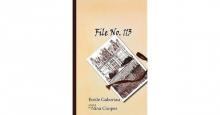 Le dossier no. 113. English
Le dossier no. 113. English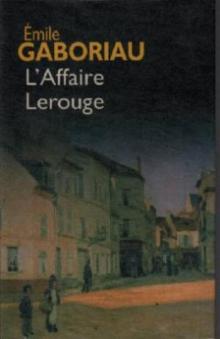 L'affaire Lerouge. English
L'affaire Lerouge. English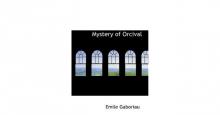 Le crime d'Orcival. English
Le crime d'Orcival. English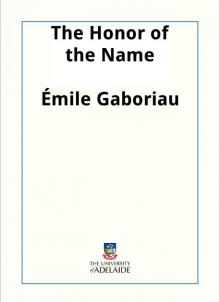 The Honor of the Name
The Honor of the Name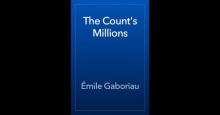 The Count's Millions
The Count's Millions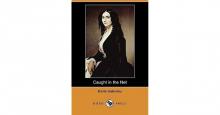 Caught in the Net
Caught in the Net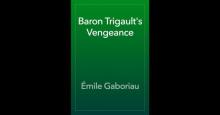 Baron Trigault's Vengeance
Baron Trigault's Vengeance La clique dorée. English
La clique dorée. English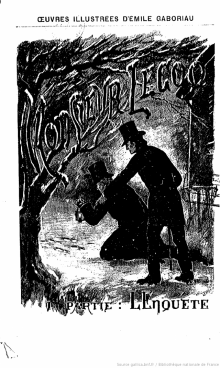 Monsieur Lecoq, v. 1
Monsieur Lecoq, v. 1 Within an Inch of His Life
Within an Inch of His Life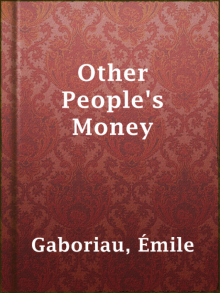 Other People's Money
Other People's Money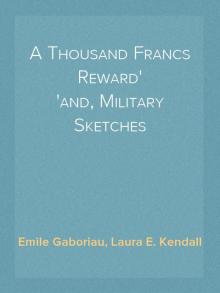 A Thousand Francs Reward; and, Military Sketches
A Thousand Francs Reward; and, Military Sketches